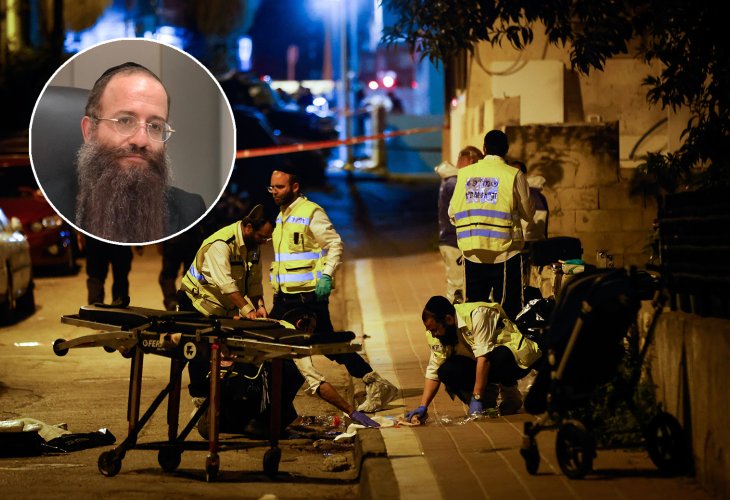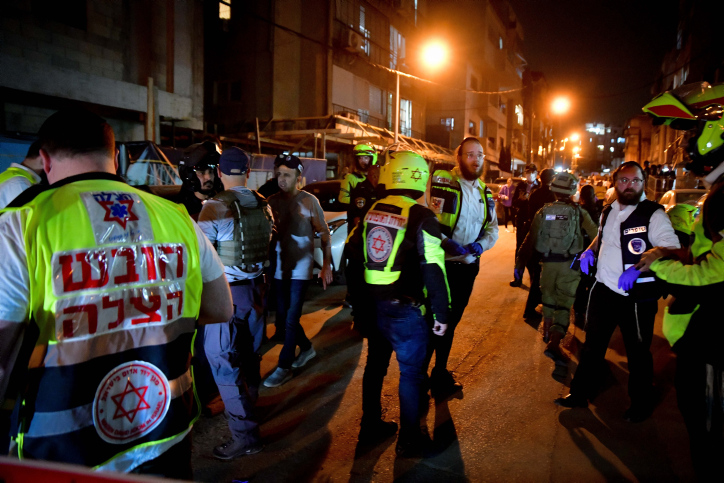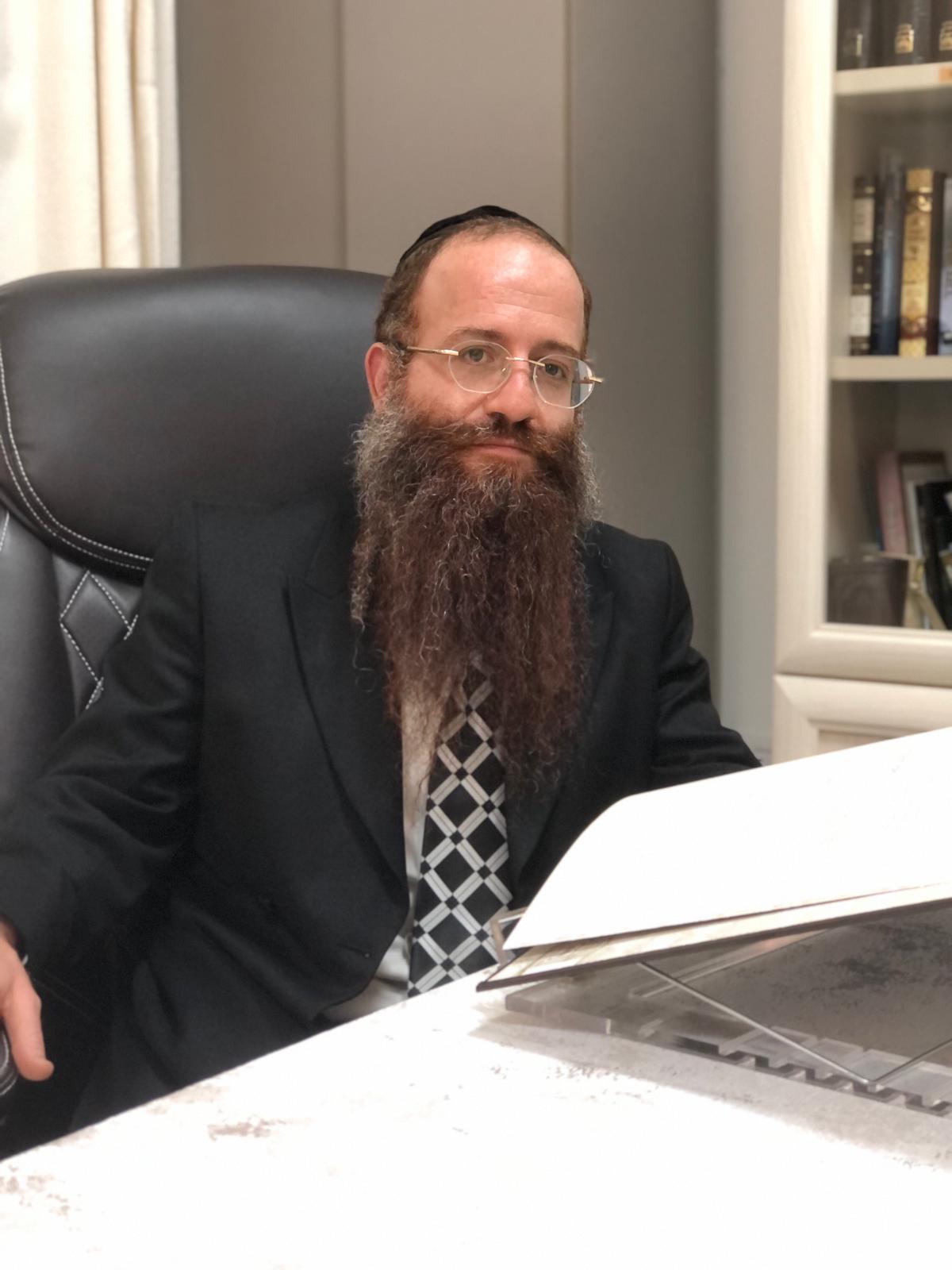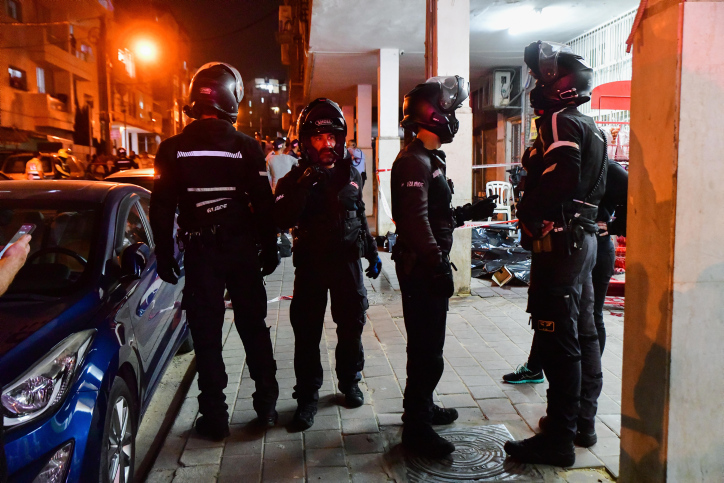"Avishai Yelled at Me on the Phone: 'Be Careful,' and Then His Voice Fell Silent": Ovadia Yosef Shares the Final Call with His Brother HYD
Rabbi Ovadia Yosef, brother of the martyred Avishai Yechezkel HYD, struggles to recover from the terrible tragedy of his brother's murder in a horrific attack in Bnei Brak about a year ago. In an interview with 'Hidabroot', he describes the chilling phone conversation that concluded with his brother's murder, the moment the family received the devastating news, and the memories that never fade.
 In the circle: Rabbi Ovadia Yosef, brother of Avishai HYD (background photo: Olivier Fitoussi / Flash 90)
In the circle: Rabbi Ovadia Yosef, brother of Avishai HYD (background photo: Olivier Fitoussi / Flash 90)"I can't forget the last phone call with my brother, during which he was shot and killed," Rabbi Ovadia Yosef tells us, head of a kollel for teaching, public speaker, and brother of Avishai Yechezkel HYD, who was murdered about a year ago in a murderous terrorist attack in Bnei Brak.
It happened on the 26th of Adar 5782, close to 8:00 PM. A 26-year-old illegal resident from the village of Ya'bad arrived by car in Bnei Brak armed. The terrorist, recently released from Israeli prison by the order of a judge, stopped his vehicle at the intersection of Jabotinsky and Herzl streets, and continued on foot towards Bialik Street in the Pardes Katz neighborhood, armed with an M-16 rifle.
From there began a horrific killing spree. The terrorist reached Herzl Street in the city, where he murdered Avishai Yechezkel, who at that moment was protecting his two-year-old son. By a miracle, the young child was unharmed.
"He called me shortly before 8:00 PM," Ovadia recounts the events of that day. "I was at our parents' house in Tel Aviv, after delivering a Torah lesson in the city. I asked about his wellbeing, but he didn't address it and rushed to warn me not to leave my home located near his. 'There are gunshots,' he updated me, thinking I was in Bnei Brak at that time."
Ovadia takes a brief pause to calm down and then continues to recount the last and chilling conversation with his brother: "'You can't imagine what's going on here,' he told me. And then he added: 'Wow.' And that was the last word he uttered."
 (Photo: Avshalom Sassoni / Flash 90)
(Photo: Avshalom Sassoni / Flash 90)Did you realize what was happening at that moment?
"It was clear to me that he was hurt," says the grieving brother. "But I didn't have time to stay on the line to try to understand exactly what was happening, because I needed to warn my wife not to leave the house. I quickly hung up and called my wife. Later, when I tried to call my brother again hoping to hear that everything was fine, the call went unanswered, and I understood he was murdered for the sanctification of Hashem. Moments later, my brother's wife called, crying desperately, asking me to go out and see what was happening with him. Luckily, I wasn't there at that time. Had I been, I know the instinct of anyone would be to go out into the street to see if everything was okay, and I estimate that I would have done the same. But at that time, the terrorist had not yet been neutralized and was still in the area, so it was too dangerous an idea."
How did you know he was killed, maybe he was only injured?
"Knowing my brother, even if he were wounded, he would have answered me. Since he didn't, I knew the situation was dire," he says, revealing a glimpse into Avishai's unique personality.
"Afterwards, I left my parents' house, said 'Shema Yisrael' and 'Hashem is the G-d'. Then I returned to my parents' house and asked about Rabbi Avishai's condition. My mother said he was probably helping the injured, and that's why he wasn't answering. I asked them if they thought we should go to Bnei Brak to see what was happening with him, and they agreed with me. We left for Bnei Brak by taxi and arrived at his home at nine o'clock.
"Already on the way, I called the police several times, but they didn't answer. I immediately understood that if they didn't respond, it was a very bad situation. Meanwhile, I heard in the media that all five people shot in the incident were killed. For me, this was confirmation of my brother's death."
"Screams to the Heavens"
At this point, Ovadia and the parents parted ways; he went to his home, and they went to his brother's house. "His young child, who was with him during the attack, was already at my brother's house when my parents arrived. I went up to my home, collapsed on the bed, poured water on myself, and tried to understand what was happening with me. I was half-conscious. It was also when I admitted to my wife and told her I thought my brother was killed. At that time, I only wished for quiet. Meanwhile, calls kept coming in, but I had no strength to answer anyone. After a few minutes of recovery, my sister called and announced in a short sentence that Avishai was killed for the sanctification of Hashem. That's how I got the news. Immediately upon hearing this, I stood up and promised myself I would be strong for the parents, but I admit – it was hard to keep that promise."
 (Credit: Chazon Yechezkel Od Yosef Chai Institutions / Yechezkel Family)
(Credit: Chazon Yechezkel Od Yosef Chai Institutions / Yechezkel Family)When did your parents realize your brother was no longer alive?
"It took time. When I arrived at my brother's house, after somewhat calming down, I found that my mother still didn't know anything. At that point, everyone around already knew. Her sisters started arriving at the house to be together during the difficult moments, and my mother asked them why they were coming. Slowly, she began to grasp and absorb the harsh news. The screams that came from the house after learning the news rose to the heavens," he recalls.
While at his brother's house, Ovadia was asked to come to Abu Kabir to identify Avishai HYD. "I felt that I couldn't do it. I told them I wanted to remember him as he was alive. Eventually, my father went. In response to worried relatives, he said he felt capable of going. He indeed identified Avishai and parted with him in tears before returning home and saying to us, 'That's what Hashem willed.' Indeed, my father strengthened us throughout the shiva and the days that followed, which were very difficult, as during the shiva, one doesn't fully absorb the magnitude of the tragedy."
Immediately after the family received the devastating news, they started organizing the brother's funeral. "We wanted to bury him in the Bnei Brak cemetery, both to keep him close to us and because great people are buried there. Those who helped facilitate this were Shas representatives, both from the municipality and beyond. They assisted us throughout that horrible night, as we were broken and shattered, managing the burial process. They also were a listening ear in the days that followed."
The Terrorist Chased Him Until He Got Him"
What really happened to your brother during those moments of the attack?
"We have additional footage aside from what was released to the public, which reveals more about what happened during those moments," he reveals. "The event occurred shortly after my brother left his home to soothe his son. He went out to Jabotinsky Street, and when he heard gunshots, he ran back towards home. He believed he would reach safety before encountering the threat (at that time, it wasn't clear there was a terrorist– D.P.).
"But just a few meters from his home, he spotted the terrorist. At first, the terrorist saw him from afar and couldn't shoot, so he began to chase after him. From footage we saw but wasn't published, Avishai took the child in his arms and ran back from the terrorist. But due to the speed and possibly a small hole in the road, my brother slipped and fell on the ground. Then the terrorist managed to reach him and shot him from a very short range."
Since then, not a day passes without the Yechezkel family feeling the heavy disaster. Rabbi Ovadia notes that "every day, as I go out into the street, I can't help looking at people passing by, thinking that everyone here lives and conducts their daily life as usual, yet my brother—the unique and precious one—is not here. But I know this is Hashem's will, and we must continue with life despite everything. I'll admit, I had very difficult days. There were long weeks where there was a real fear of going out into the streets. People didn't even take out the garbage from their homes due to fear.
"Practically, nearly every event reminds me of my beloved brother. I remember when Passover arrived the year following the attack, on Seder night at my parents' home. We tried to sit and rejoice. During the evening, I remembered how each year he would lead the seder with wonderful insights he came up with himself. I recall holding back tears with all my might during the great night. The holiday passed with a tough sense of lack that remains to this day.
"Lag BaOmer last year is also particularly remembered for the absence I felt. It took me back to the previous year when we listened together to the Torah teachings of Rebbe Shimon bar Yochai, and afterward, as every year, traveled to the holy site in Meron, where he danced all night until morning. At least my brother had the privilege of completing the Zohar before ascending as a korban to the world to come."
But the great difficulty visits Ovadia daily, especially on Shabbat nights. "Before the attack, I would sit with my brother every Shabbat night, and we would study together, sharing many new insights. He wouldn't accept just any insight; he demanded me to come up with better and better novelties. Only when I offered him a particularly special thought would he enjoy it immensely, and we would both elevate ourselves in the learning of Torah."
A Synagogue in the Way of the Brother
These days, the family is leading a significant project to commemorate Avishai. "We initiated a crowdfunding project to establish a synagogue in memory of my brother, something like his will for me. We submitted the allocation a month before, with no connection to the attack, intending to create a place of Torah in the spirit of Maran. My brother was the driving force behind submitting the request, telling me that if I wanted to perpetuate Maran's way in Torah and prayer, we must establish a synagogue for this purpose.
"Shortly after I'd submitted the request, my brother was murdered, and I was left to advance the idea alone. The effort succeeded, and during the shiva, Shas chairman Aryeh Deri came to console us and asked if we needed anything. We told him about the desire to build a synagogue, which now became for the elevation of the soul of the initiator. Deri promised that, with Hashem's help, he would do everything to grant us the allocation. And indeed, he fulfilled his word, securing the allocation."
 (Photo: Avshalom Sassoni / Flash 90)
(Photo: Avshalom Sassoni / Flash 90)Now the family is launching a crowdfunding campaign to build the synagogue. "I am sure that this will cause much joy to my brother. To this end, we even established an organization named 'Chazon Yechezkel Od Yosef Chai', as part of our dream to incorporate the project also in memory of our brother and in the spirit of Maran of blessed memory, hence the organization is also named after Maran."
Now, with the preparation to build a house for Hashem in memory of his brother, Ovadia declares that days will come, and Jews will sit in the synagogue named after his holy brother, delving into Torah on Shabbat nights, turning that difficult memory of personal absence into a source of growth and Torah expansion in this world: "The voice of Torah, the legacy of my brother, will be heard again in this world," he says.
In conclusion, what comforts you in this heavy loss?
"The thing that maybe comforts the most is the fact that my brother saved others by his death, because at those moments, no one knew where the terrorist was. The first officers on the scene were looking for the terrorist but didn't know where he was. Then the gunshots that hit my brother were heard, directing the officers towards the terrorist." All Israel became acquainted with the moments that followed: Officer Amir Khoury, a Christian Arab, arrived with another officer on a police motorcycle at the scene. The terrorist fired at them from his hiding place, Khoury was killed, and the other officer neutralized the terrorist, but this could no longer help the Yechezkel family. Avishai, the dear brother, was murdered. HYD.

